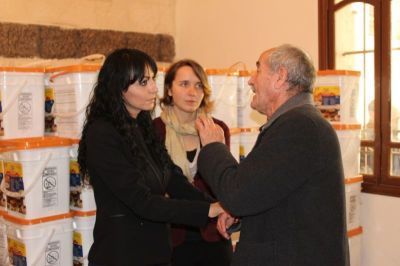ISIS isn’t biggest problem for Assyrian Christians in Northern Iraq

Assyrians are one of the first nations to convert to Christianity and have played a massive role in the spreading of Christianity throughout the world. According to the Assyrian Church of the East, the Apostle Thomas converted Assyrians to Christianity within a generation after the death of Jesus.
To this day, Assyrians still speak a version of the language of Jesus, Aramaic. "Aramaic was a broader family of languages," said Nicholas Al-Jeloo, a prominent expert of Assyrian and Middle East history. "Jesus spoke Galilean Aramaic and Assyrians speak Assyrian Aramaic."
Yet, in this ancient land of Assyrians that is now ruled by the Kurdistan Regional Government (KRG), rights abuses against Assyrian Christians are ongoing. International Christian Concern (ICC) has extensively reported on such abuses including land grabs.
In 2018, for instance the ICC "learned that two Kurdish Muslim brothers built an illegal home on the land of an Assyrian Christian in northern Iraq’s Brefka village. According to the Assyrian Aid Society, one of the brothers, Omar Karem, is the head of the Peshmerga Forces in the region. The land-grabbing case took place on April 20, 2018 and was reported in writing to the local authorities on May 2, 2018. There has since been no change on the ground.”
"The illegal seizure of Christian lands in this region has been ongoing since 1991, according to the Assyrian Aid Society (AAS). They estimate that approximately 180 acres of Assyrian-Christian land has been seized by their Muslim neighbors. ‘Land has been taken in different places in the village, especially near the river Khabour and near the school. In 2005, Mr. Barzani sent [a delegation] to visit the village. They promised to return the land back to Assyrians in one year, but nothing has happened until this moment,’ said the Assyrian Aid Society."
In July of 2020, ICC reported again:
"Iraq’s Nahla Valley, located within the Kurdistan Regional Government (KRG), is a historically Assyrian Christian area that has long been subjected to land-grabbing attempts. The village has fought these attempts through a court of law. However, an earlier court’s decision protecting their rights over the land has now been reversed. The decision impacts approximately 117 Christian families who rely upon the land as a source of livelihood as they farm crops and raise livestock.
"These families hold a land title deed from the 1950s confirming their right to this land. The title deed was updated in 2015. The current problem with land-grabbing traces back to the early 1980s, when a radical Islamic sheikh encouraged Kurdish families to build homes and other structures on the Christians’ land. Today, these families have lost access to approximately 75% of their property. Such critical loss makes it impossible to sustain their normal source of livelihood. Kurdish families continue building new structures on the remaining land, as witnessed by ICC during a fact-finding trip.”
Claire Evans, ICC’s Regional Manager, said that the most pressing issues Assyrians face in the Kurdistan Region of Iraq (KRI) are intimidation, land grabbing by Kurdish tribes and a lack of a free press.
"There is a culture of intimidation that is present throughout most human rights violations in the KRG, something which often goes unnoticed by the larger international community. Assyrian Christians displaced by ISIS fled here for a reason, it's the better alternate. But it's an alternative, not a dream destination. We cannot make the mistake of thinking that all is well within the KRG on human rights issues.”
Earlier in March, Iraqis witnessed a historic pilgrimage by Pope Francis who first arrived in the nation's capital, Baghdad, from which he flew to Erbil on the third day of his Apostolic Journey. While there he celebrated Holy Mass at the Franso Hariri Stadium with regional Christians.
Among the indigenous peoples of this land are Assyrians, who built ancient cities of Assur and Nineveh in northern Mesopotamia, now present-day Iraq. That land is called "the cradle of civilization" by many historians and produced immense intellectual, archeological and scientific developments throughout the centuries. For instance, the Cyrus Cylinder, a 2,600-year-old clay artifact, was made on the order of the Persian King Cyrus after he captured Babylon in 539 BC.
Referred to by some scholars as the "first bill on human rights", the cuneiform inscriptions on the cylinder promotes the freedom of religion and allows displaced people to return to their homelands.
Yet Assyrian Christians now living in this land need the international community to recognize the challenges and rights abuses they face in the KRI.
"For the Assyrian Christians, there needs to be recognition from the international community that their challenges are more than just ISIS, and that some of those challenges include the KRG directly. We need to talk about the land-grabbing, that is a huge problem and it's a solvable one, but it desperately needs international pressure and observation. And whenever examples of intimidation occur – whether in the land-grabbing context or perhaps against journalists who cover human rights issues – we need to be clear that this is unacceptable.
"Silence and isolation always worsen the challenges experienced by victims of human rights violations. We need to shine light on those issues, especially because when they are properly addressed, it benefits the whole of society not just one segment.”
Juliana Taimoorazy is the founding president of the Iraqi Christian Relief Council (ICRC).
Uzay Bulut is a Turkish journalist and political analyst formerly based in Ankara.




















